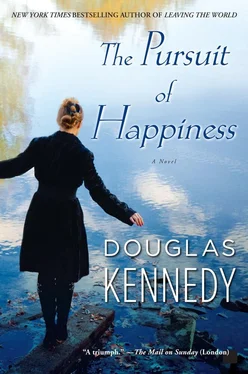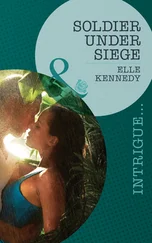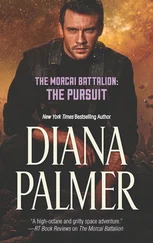'How'd you manage to run through all that money?' I asked him.
'Living the high life', he said, sounding sheepish.
'But I thought the high life was against all your political principles'.
'It was. It is'.
'So what happened?'
'I blame it all on too much sun. It turned me into a very generous, very dumb loco gringo. But I promise to resume wearing a hairshirt immediately'.
Instead, he landed a job writing a few episodes of Boston Blackie. When he was fired off of that show, he talked his way on to The Quiz Bang Show, churning out gags for Joe E. Brown. He never mentioned the play he was supposed to be writing during his year away - and I never asked. His silence said it all.
But he dropped right back into his wide circle of arty friends. And on the night before Thanksgiving of '45, he threw a party for all of them.
I had already been invited to an annual soiree given by one of Life's senior editors. He lived on West 77th St between Central Park West and Columbus - the street where the balloons for next morning's Macy's Thanksgiving Parade were being inflated. I promised Eric that I would drop by his bash on my way home. But the editor's party ran late. Thanks to the Macy's balloons (and the crowds who had come out to watch them being pumped up), all the streets around Central Park West were closed, so it took over half an hour to find a cab. It was now midnight. I was dead tired. I told the driver to take me to Bedford Street. As soon as I walked into my apartment, the phone rang. It was Eric. In the background I could hear his party in full swing.
'Where the hell have you been?' he asked.
'Playing office politics on Central Park West'.
'Well, get over here now. As you can hear, the joint is jumping'.
'I think I'll pass, E. I need to sleep for a week'.
'You have the rest of the weekend to do that'.
'Please let me disappoint you tonight'.
'No. I insist you hop a fast cab, and present yourself tout de suite at chez moi, ready to drink 'til dawn. Hell, it's the first Thanksgiving in years without a war. Surely that's a good enough excuse to destroy some brain cells...'
I sighed loudly, then said,
'Will you provide the aspirin tomorrow?'
'You have my word as a patriotic American'.
So I reluctantly put my coat back on, headed downstairs, hailed a cab, and within five minutes, found myself smack dab in the middle of Eric's party. The place was packed. There was loud dance music on the Victrola. A low cloud of cigarette smoke bathed his tiny apartment in a fuggy haze. Someone pushed a bottle of beer into my hand. I turned around. And that's when I saw him. A fellow around twenty-five, dressed in a dark khaki Army uniform, with a narrow face with sharply etched cheekbones. His eyes were also scanning the room. They suddenly happened upon me. I met his gaze. Only for a second. Or maybe two. He looked at me. I looked at him. He smiled. I smiled back. He turned away. And that was it. Just a simple glance.
I shouldn't have been there. I should have been home, fast asleep. And I've often wondered: had I not turned around at that very moment, would we have missed each other completely?
Fate is such an accidental thing, isn't it?
Two
THE FRONT DOOR suddenly flew open. Ten more folk tumbled into the apartment. They were all very loud, very boisterous, and very well lubricated. The room was now so crowded it was impossible to move. I still couldn't see my brother - and was beginning to get a little cross about being talked into coming to this absurd party. I loved Eric's friends, but not en masse. Eric knew this - and often teased me about being anti-social.
'I'm not anti-social', I'd retort. 'I'm just anti-crowds'.
Especially - I could have added - crowds in tiny apartments. My brother, on the other hand, adored mob scenes, and being part of a pack. He always had tons of friends. A quiet night at home was never pondered. He had to be meeting pals at bars, or finding a party to crash, or hitting jazz joints, or (at the very worst) squandering the evening in one of those all-night movie houses that lined 42nd Street - and showed triple features for twenty-five cents. Since his return from South America, his talent for gregariousness had reached new heights - to the point where I was beginning to wonder if he was ever finding time to sleep. He'd also reluctantly changed his appearance to get that job as a gag writer for Joe E. Brown. He'd trimmed his hair and stopped dressing like Trotsky - because he knew he wouldn't be hired unless he conformed to the buttoned-down sartorial norm that was demanded back then.
'I bet Father's rolling with laughter in his grave', he said to me late one evening, 'knowing that his redder-than-Red son now buys his clothes at Brooks Brothers'.
'Clothes mean nothing', I said.
'Stop trying to sweeten the pill. They mean everything. Everyone who knows me understands what these clothes mean: I've failed'.
'You're not a failure'.
'Anyone who starts off thinking he's the next Bertolt Brecht - but finally ends up churning out jokes for a quiz show - is allowed to call himself a failure'.
'You'll write another great play', I said.
He smiled sadly.
'S - I've never written a great play. You know that. I've never even written a good play. And you know that too'.
Yes, I did know that - though I would never have said so. Just as I also knew that Eric's increasingly manic social life was a form of anaesthetic. It deadened the ache of disappointment. I knew he was blocked. And I also knew what was causing the block: a total collapse of confidence in his talent. But Eric refused to let me sympathize with him - always changing the subject whenever I brought it up. I finally took the hint and dropped the matter completely - ruing the fact that I couldn't get him to talk about his obvious distress, and feeling rather helpless as I watched him obsessively fill every waking moment with a binge of diversions... of which this party was yet another syndrome.
As the noise level in his living room reached the level of uproar, I quickly decided to make an exit if I didn't see my brother in the next sixty seconds.
Then I felt a hand lightly touch my shoulder, and heard a male voice in my ear.
'You look like someone who's looking for an escape hatch'.
I spun around. It was the fellow in the Army uniform. He was standing inches away from me, a glass of something in one hand, a bottle of beer in the other. Up close, he looked even more damn Irish. It was something about the ruddiness of his skin, the squareness of his jaw, the touch of mischief in his eyes, the fallen angel face which hinted at both innocence and experience. He was a less pugnacious version of Jimmy Cagney. Had he been an actor, he would have been perfect casting as the sort of idealistic young neighborhood priest who gave Cagney last rites after some rival gangster peppered him with lead.
'Did you hear me the first time?' he shouted over the roar of the party. 'You look like someone who's looking for an escape hatch'.
'Yes, I did hear you. And yes, you're very perceptive', I said.
'And you're blushing'.
I suddenly felt my cheeks redden a little more. 'It must be the heat in here'.
'Or the fact that I am the most handsome guy you've ever seen'.
I looked at him with care, and noted that he was raising his eyebrows playfully.
'You're handsome, all right... but not drop-dead handsome'.
He studied me admiringly for a moment, then said, 'Nice counterpunch. Didn't I see you fight Max Schelling at the Garden?'
'Would you be talking about the Bronx Botanical Gardens?'
'Your name wouldn't happen to be Dorothy Parker, would it?'
'Flattery will get you nowhere, soldier'.
'Then I'll have to try getting you drunk', he said, pushing a bottle into my empty hand. 'Have a beer', he said.
Читать дальше












